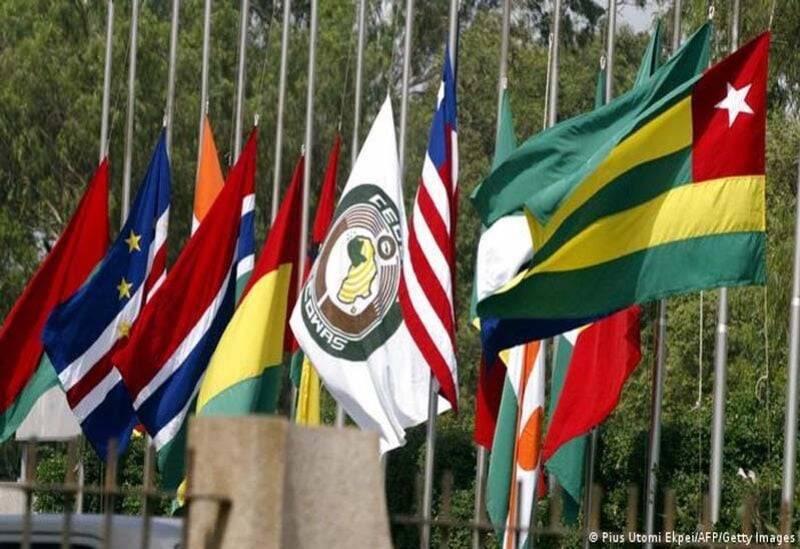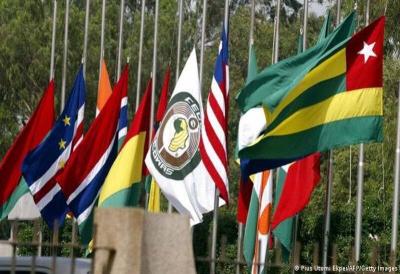The coup in Niger has brought renewed attention to the Economic Community of West African States (ECOWAS), which is holding an urgent summit today in Abuja, the Nigerian capital, to discuss the situation in Niger, where President Mohamed Bazoum has been held since last Wednesday by members of his guard. Is there an effective role for the group in resolving the crisis in Niger?
"ECOWAS" comprises 15 countries with a total population of over 261 million (2006 statistics), covering a total area of five million square kilometers, which is 17 percent of the total area of Africa. Mauritania was the only Arab member but withdrew in 2001. Among its objectives is the promotion of economic cooperation and trade between countries in the region as a pathway to comprehensive economic integration.
**Origins**
The idea of establishing a framework for economic cooperation among West African countries dates back to the 1950s. It was translated into the customs union established in 1959 between the Mali Federation (Senegal and Mali) and the four countries of harmony: Burkina Faso (formerly Upper Volta), Benin (formerly Dahomey), Niger, and Côte d'Ivoire. In 1972, the project was revived by Nigerian President Yakubu Gowon and Togolese Gnassingbé Eyadéma, who undertook a lengthy tour in 12 African countries to persuade their leaders to participate in the project. Following this tour, a meeting of experts was called in Lomé, where a treaty proposal was presented, and steps toward establishing the new framework accelerated.
The organization was established on May 25, 1975, under the Lagos Treaty, with its headquarters in Abuja, Nigeria. It is currently headed by Nana Akufo-Addo. The official languages are English, French, and Portuguese. ECOWAS also functions as a peacekeeping force in the region, with member states sometimes sending joint military forces to intervene during times of political instability and unrest in one of the member countries. Recent interventions include those in Côte d'Ivoire in 2003, Liberia in 2003, Guinea-Bissau in 2012, Mali in 2013, and The Gambia in 2017. The Economic Community of West African States includes the Commission of ECOWAS, the ECOWAS Court of Justice, the ECOWAS Parliament, the ECOWAS Bank for Investment and Development (EBID), the West African Health Organization (WAHO), and the Intergovernmental Action Group Against Money Laundering and Terrorist Financing in West Africa. It also encompasses two monetary economic blocs: the West African Economic and Monetary Union (UEMOA) and the West African Monetary Zone (WAMZ).
**Sanctions**
Today, ECOWAS imposed economic sanctions and travel restrictions on the new military leaders in Niger, threatening to use force if President Mohamed Bazoum, whom they ousted, is not restored to power within a week. The group's response comes in the wake of the seventh coup in the Sahel in a few years and coincided with military council supporters in Niamey, the capital of Niger, setting fire to French flags and throwing stones at the French Embassy, prompting police to use tear gas to disperse them. Images showed fires at the walls of the French embassy and injured individuals being carried to ambulances with blood-soaked legs.
During the emergency summit in Nigeria to discuss last week's coup, ECOWAS leaders called for the complete restoration of constitutional order, threatening to take action if this does not happen. The statement said, "These actions may include the use of force,” adding that defense officials would meet immediately for this purpose. ECOWAS and the eight-member West African Economic and Monetary Union stated that effective immediately, borders with Niger would be closed, commercial flights banned, financial transactions halted, national assets frozen, and aid stopped. They added that military officials involved in the coup would be banned from traveling and their assets would be frozen.
**Condemnation**
The coup in Niger has been condemned by many neighboring countries and international partners, including the United States, United Nations, African Union, European Union, and France, which previously colonized Niger. They all rejected recognition of the new leaders led by General Abdourahamane Tiani. Niger is one of the poorest countries in the world, receiving official development assistance estimated at about two billion dollars annually, according to the World Bank. The United States, France, Italy, and Germany deploy troops there for military training and missions against Islamist rebels. Niger is also the seventh largest producer of uranium in the world, a radioactive mineral widely used in nuclear energy and weapons, as well as in cancer treatment.
ECOWAS thanked countries that expressed positions in line with those of the group and "condemned the announcement of support (for the coup) from some foreign governments and foreign military contractors."
**Niger’s Prime Minister**
Meanwhile, Niger's Prime Minister in Bazoum's government, Hamadou Mohamadou, stated that ECOWAS's sanctions would be catastrophic due to the country’s heavy reliance on international partners to cover its budget needs. Mohamadou, who was abroad when the coup occurred, told "France 24" from Paris, "I know the fragility of the situation in Niger and the economic and financial context after having been Minister of Finance and now serving as Prime Minister." He added: "This is a country that will not be able to withstand these sanctions. It will be catastrophic."




